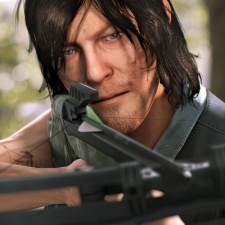While the record of mobile games based on movie and TV licences is better than console games, there's generally a disconnect between the two.
Which makes Next Games' launch and operation of The Walking Dead: No Man's Land something of a miracle.
Not only was the game released at the right time - alongside Season 6 of the TV show - it referenced and engaged Walking Dead fans, while also providing a great experience for players of action RPGs.
So how did everything go so right?
We caught up with the game's executive producer Sulka Haro to find out.
How did Next Games get access to The Walking Dead TV series license? Was this part of the company's formation or a post-formation discussion/negotiation?
Sulka Haro: Next Games was founded in May 2013 and shortly after the first five of us (4 co-founders + our CEO) got together to talk about the company strategy. We had plenty of game concepts and ideas of our own, but we also started to look into 3rd party IP.
With 3rd party IP, we wanted to work with something that has longevity and proven traction. Everyone in the team was a huge The Walking Dead fan and we decided to go after that. We feel that it is imperative that the game team is passionate about the IP they are working on in order to make a good game.
We also wanted to find a partner who’s in it with us 100%. Next Games was looking for a partner who understands the medium and potential that mobile games present, in addition to IP.
We wanted a partner who’s in it for the long term and we are very lucky to have found one in AMC.Sulka Haro
This means that we weren’t looking for a deal where we pay for a license and the license owner “hands the keys to the Ferrari” and checks back in a year later. We wanted a partner who’s in it for the long term and we are very lucky to have found one in AMC.
We put a lot of effort to the concept, went through a lot of work to get through to the right people at AMC, and pitched hard. Us and AMC had very similar thoughts on how the show would translate into a game and what the experience should be. That was what in the end sealed the deal plus our 10+ years experience in the games business
What were the key elements of the TV series that you wanted to deeply embed in the game?
A lot of our key decisions were a result of mutual design with AMC. Take permadeath, for example: you can go on missions in the game where your character that you have had for a long time can permanently die. This breaks the norm of mobile games where designers are extremely wary of causing any setback to the player.
We felt the opposite - this is a great way to bring the extreme decisions in the show through gameplay mechanics instead of through narrative methods which are limited on the platform.
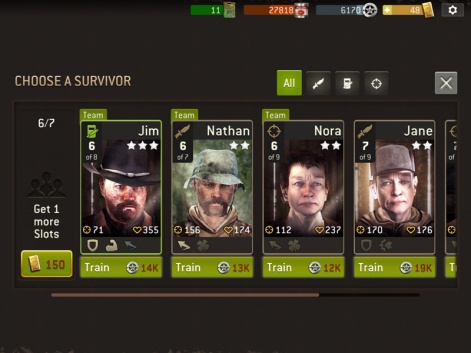
While we were debating this internally, AMC actually urged us to test this out and be bold about breaking the mold when it fits the brand.
You can go on missions where your character that you have had for a long time can permanently die.Sulka Haro
This paid off, too - this is clearly a feature that evokes emotions in players exactly in the way we hoped for. The result of your decisions and losses have a long-term positive impact on the players: every decision counts for so much more when there is more at stake.
Some of our collaboration was more subtle than that. For example, our user interface design initially featured character portraits as small thumbnails. AMC saw characters as such a vital part of the brand that through mutual design we shifted direction and started displaying them a lot more prominently.
Once this visual change was in, it was immediately obvious it was far easier to get attached to your group of characters. This was not a change in functionality, only presentation, but the effect was significant.
Why did you think the base-building, turn-based strategy genre was the best framework for the licence, especially in terms of integrating the show's atmosphere?
Gameplay-wise we wanted to take a tactical approach to the game, to bring depth with the turn-based mechanic but rework it into an approachable, mobile-native environment. This worked well with us also wanting to highlight the drama and tension of the show where walkers closing in is always bad news.

The structure of No Man’s Land is such that you can quickly check your camp, collect resources and upgrade your buildings if you’re in a rush. If you want to go deeper, you can go on tactical missions where you have control over how intense you want the action to be - and collaborate with others.
In the earliest stages of development the game revolved around reflex-based action mechanics, but we soon found out that it didn’t lend itself well to picking the game up and playing it at your own pace. We decided to change direction and pursue a turn-based combat mechanic that allows you to make your decisions at your own leisure.
The design philosophy goes a little deeper than that, too. A lot of games that have tactical combat feature huge maps and you need to keep a lot of things on your mind as you play - all of which makes it harder to come back to the game.
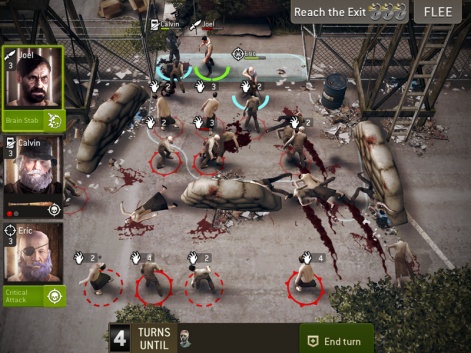
We wanted to cater to the modern player who wants to pace their gaming according to their daily schedules and made straightforward linear maps which allows a player to see exactly what the tactical situation is the second they come back to the game. The depth is layered and comes from leveling up your survivors and choosing what kind of missions to undertake.
What is your approach in terms of using the TV series' narrative and characters within the game?
There has to be familiar elements for the fans to identify with, but we recognized we had to also give the players room to form their own experience in the show’s world. We will be introducing more familiar elements over time, all the while expanding the possibilities the players have for forming their own thing.
In The Walking Dead: No Man’s Land, the environments and locations are recognizably the same or similar as in the TV show, such as the Prison or Terminus. We wanted to leave room for the player however to create their own survival strategy and in a way their own story, and thus we have not forced a linear story line.
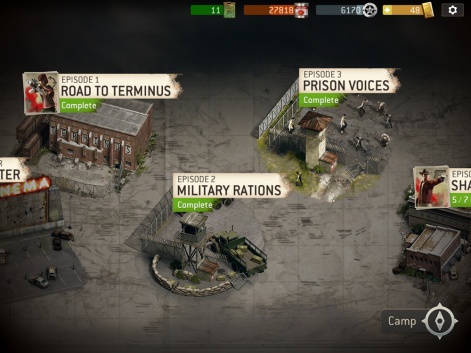
What’s interesting also is that No Man’s Land has almost infinite amount of characters. We have a system that generates new unique survivors for the players as they progress through the game. This means that every player’s team is unique and the experience is a very personal one.
The game also features Daryl Dixon, who’s one of the fan-favorite characters from the TV show.
How much did you actively think about making a game that would appeal to players who haven't watched the TV series?
It was a factor, but making sure the fans were getting a game in line with their expectations was more important.
The game is built on Unity. The backend solution is our own.Sulka Haro
For instance the intro with Terminus doesn’t make much sense if you’re not familiar with the show, and we don’t give any background to Daryl Dixon’s character; we assume the players know all that, and don’t want to waste anybody’s time going into it.
On the other hand, it is not an obstacle if you are not familiar with the TV show narrative.
How long was the game's development period, what was the average development team size, and what significant tools did you use?
The game is built on Unity. The backend solution is our own.
The core team was the total of 20-35 people including the core dev team, backend, marketing and other supporting functions - depending on the phase of development.
Working with a licensor means a more complex approvals process. How have you found that process?
We have a very close relationship with AMC - they have invested in Next Games, after all. A deep mutual understanding needs to exist between a game studio and the IP owner.
Not only do the game developers need to understand what makes the IP tick on a fundamental level, but the IP owner needs to realize what works and what doesn’t work well in a game.
To this end, AMC has staff that is intimately familiar with game development and already have a vision of how their brand could work in a game. Understanding the iterative nature of mobile games development at both ends has been fundamental to delivering a successful game.
A dedicated person from the AMC team with game design experience interacts with the development team’s creative and production leads on a weekly - and sometimes daily - basis.
There was a long discussion about tap to move versus swipe to move, and single versus multiple action points per move.Sulka Haro
The dialogue wasn’t about filling pre-planned checkboxes on an excel sheet signed at the beginning of the project but rather discussions about the details of features and how to get the most out of them in the context of The Walking Dead brand.
So, AMC fully let the Next Games team take the lead on designing the game and they helped us to stay true to the IP.
This applied also for the marketing collaboration, we worked very closely with the AMC team to align our marketing plans and creative so that we are as close to the TV show universe as possible.
What do you think was the biggest challenge that you overcame during the development process?
The core interaction.
There was a long discussion about tap to move versus swipe to move, and single versus multiple action points per move. We feel like we ended up with something cool and unique.
At what stage of development process did you think you had an experience that matched your initial expectations?
It’s getting there now with a big update we’re preparing for season 6B.
Looking at what we launched with, the big turning point was somewhere around June 2015. The swiping mechanic came about, and we had found the right size for the levels.
Then our initial vision of every move being an important one, and every turn being readable as-is without thinking back to what you were doing on the previous turn, started working.
What feedback did you take from operating Compass Point: West, which is broadly the same sort of game?
Launching Compass Point: West taught us a lot about running a live product.
There are a lot of experienced game developers at Next Games, but developing, launching and running a live game with a new team always has its surprised so it was good to have that experience under our belt.
Both games share a lot of the server technology that’s running in the background so we were able to utilize that very effectively. We’ve built our infrastructure in a way that we’ll be able to scale it for our future projects.
Both Next Games and AMC are in this for the long run and the first priority is to focus on getting the experience feel right.Sulka Haro
Your approach to monetisation seems to be fairly light, both in terms of retailing and the underlying time-gates. How much did you discuss monetisation with the licensor?
Both Next Games and AMC are in this for the long run and the first priority is to focus on getting the experience feel right for the players, including monetization.
The business model and monetization is a topic among all the other things we discuss on a regular basis. AMC has given us their full trust and support to design a great game for the fans.
You've done a good job of integrating incent video ads, so how is that revenue channel working, especially in terms of having sufficient fillrate?
It is working very well.
For us it was important that the players should feel like they choose to view ads because there is value in exchange - not because we’re forcing them to.
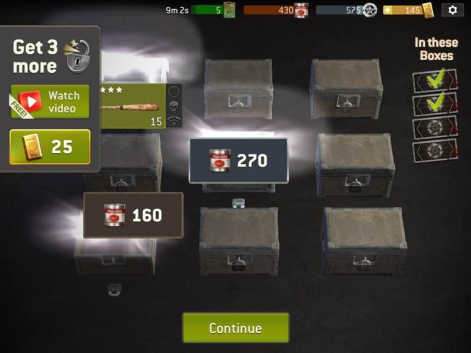
They should remain something the players look forward to and not a distraction so we treat our ad implementation as a feature among other features, not something that’s developed separately from the rest of the game.
How happy have you been in terms of the reaction to the game?
Very happy indeed! The big gamble here was whether a sufficient number of people would take to our relatively heavy strategic approach. It seems like they do.
What are you plans for the longterm operation of The Walking Dead: No Man's Land, especially in terms of linking into the ongoing TV show?
Our immediate focus now that the game is out is to listen to our fans and work to add to our already existing list of content and features - some of that based on the TV show.
There will be a significant focus on more interaction between the players as well as fresh new content that runs parallel to what is happening in the series.
To hear more about The Walking Dead: No Man's Land and Next Games plans, join CEO Teemu Haahtinen and a host of other leading names from Fox to Namco Bandai and Wooga to Wargaming as they discuss the role of brands in mobile games industry at Pocket Gamer Connects London on Jan 18-19th.

